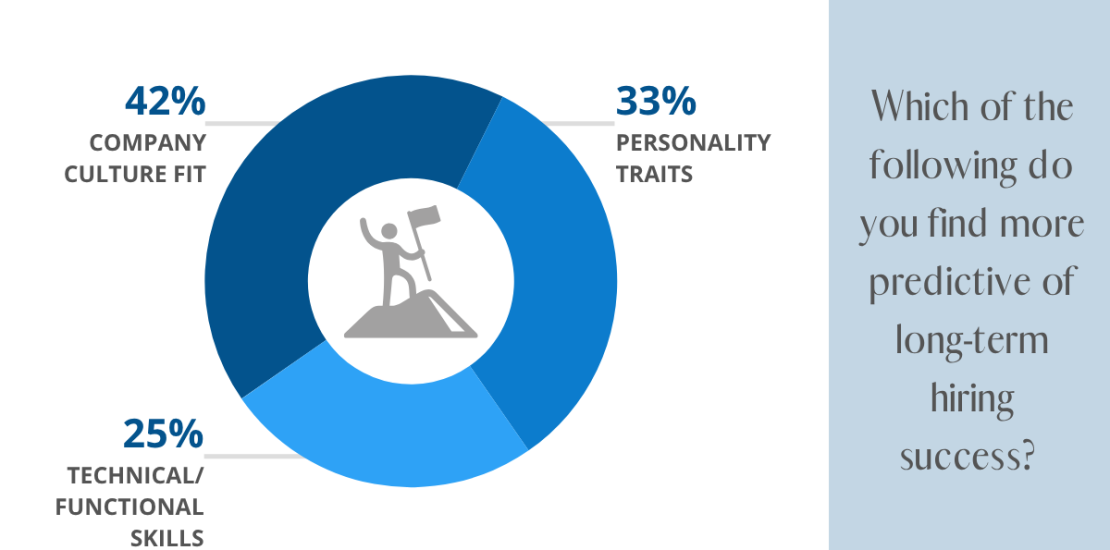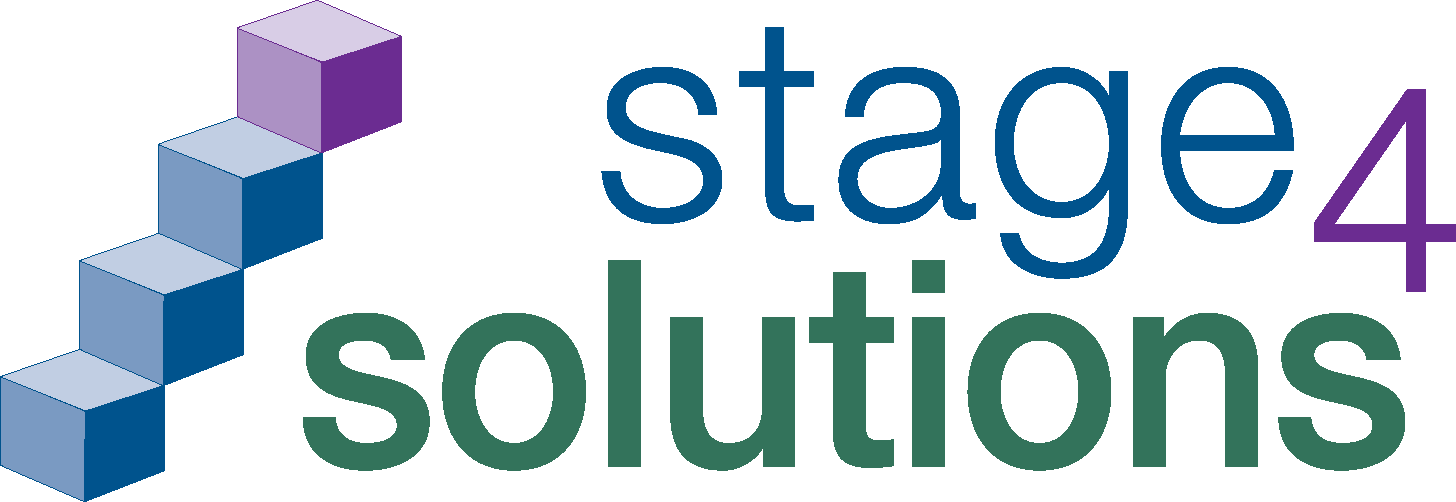The Real Drivers of Long-Term Hiring Success
- October 27, 2025
- Posted by: Stage 4 Solutions
- Category: Blog

Hiring the right people is one of the most important drivers of organizational success. Even a single wrong hire can have ripple effects across productivity, team morale, and financial performance. Research from the U.S. Department of Labor shows the cost of a bad hire can reach up to 30% of a first-year salary and as high as 50% for managerial positions.
To understand which factors employers find most predictive of long-term success, we polled our community for their insights.
Which of the following do you find more predictive of long-term hiring success? (single answer)
- Company culture fit: 42%
- Personality traits: 33%
- Technical/functional skills: 25%
Company Culture Fit: Alignment That Drives Retention and Engagement
The majority of respondents (42%) identified company culture fit as the most reliable predictor of long-term hiring success. This finding reflects a truth many organizations experience firsthand: technical skills can secure a job offer, but cultural alignment has the greatest impact on whether an employee will stay, perform, and grow.
Every organization has its own culture that consists of the shared values, behaviors, and ways of working that shape how people interact and make decisions. A small, fast-moving startup that thrives on agility and experimentation operates very differently from a large enterprise with layered processes and risk controls. Candidates bring the culture of their previous workplaces with them, and those ingrained habits influence how they collaborate, communicate, and approach challenges.
Even a highly skilled professional can struggle if their natural work style or values clash with the organization’s environment. For example, someone accustomed to the structure and resources of a large corporation may feel constrained in a startup where priorities shift daily, while an entrepreneurial problem-solver may find a highly regulated or hierarchical organization restrictive. In both cases, the mismatch can lead to frustration, disengagement, and eventual turnover, despite strong technical performance.
A strong cultural fit doesn’t mean hiring for sameness; it means ensuring alignment with core principles. When organizations hire individuals who share their core values yet bring new perspectives, they build teams that are both cohesive and innovative, a foundation for sustained, long-term success.
Because cultural alignment plays such a pivotal role in retention and engagement, evaluating it early in the hiring process is essential. Employers can take several steps to do this effectively:
- Define and articulate culture clearly. Go beyond generic values and describe how work actually gets done, how decisions are made, how teams communicate, and what behaviors are rewarded.
- Build interview questions that test cultural alignment. Ask candidates to describe situations where they thrived or struggled, or how they handled ambiguity, feedback, or teamwork. Their answers often reveal underlying values and preferences.
- Validate culture fit through references. During reference checks, inquire not only about performance but also about the culture of the candidate’s previous organizations and how they adapted within those environments.
Personality Traits: The Behaviors Behind Consistent Performance
According to one-third of respondents, personality traits are the leading predictor of long-term success. This finding highlights that performance at work is influenced by how individuals apply their skills, interact with others, and respond to challenges.
Personality traits shape communication, decision-making, collaboration, and resilience, which are essential to how teams perform under pressure. Two employees with equal technical ability can produce very different results based on their temperament, self-awareness, and emotional intelligence. Personality, in essence, determines how skills are expressed and how teams function when faced with stress or change.
While some traits, such as accountability, adaptability, and integrity, are universally valuable, others are more role-specific. For example, persistence and resilience may be vital for sales or client-facing positions, while patience and attention to detail are more critical for analytical or quality-focused roles. Recognizing which personality traits are most important to a specific function helps organizations hire individuals who can not only perform but thrive in their environment.
To evaluate personality fit effectively, employers can take the following steps:
- Use consistent, behavior-based interview formats. Structure interviews around defined competencies with clear rating criteria to ensure fairness and consistency.
- Ask situational questions that test adaptability, empathy, and resilience. For instance: “Tell me about a time you handled unexpected change or a challenging team dynamic.”
- Include practical assignments when appropriate. Depending on the role, live exercises or take-home work samples can reveal how candidates think, communicate, and collaborate in real scenarios.
- Leverage validated assessment tools. Personality assessment tools can help organizations identify patterns among top performers. By tracking data points across teams, employers can pinpoint which traits correlate with long-term success and use those insights to guide future hiring.
- Verify personality traits during reference checks. Ask references about the candidate’s work style, adaptability, and interactions in past roles to confirm alignment with your team’s needs.
Technical/Functional Skills: The Foundation of Capability
One in four respondents identified technical/functional skills as the top predictor of long-term success. While this ranks below culture fit and personality traits, it remains an essential component of performance. Technical competence is the foundation on which all other success factors rest, as without it, even the best cultural alignment or attitude cannot deliver results.
Skills determine whether an employee can perform the immediate requirements of the role, meet quality standards, and contribute to productivity from day one. However, in today’s rapidly changing work environment, skills alone are no longer sufficient. Technologies evolve, processes shift, and business models transform, meaning that what is technically relevant today may be outdated tomorrow. For this reason, employers increasingly prioritize learning agility and the ability to continuously acquire new skills as indicators of sustained success.
Technical and functional expertise also varies widely by role and industry. A financial analyst, for example, must bring analytical precision and data fluency, while a project manager needs organizational discipline, risk management knowledge, and communication skills. Understanding which technical capabilities are truly mission-critical versus those that can be developed post-hire helps employers make smarter hiring decisions and avoid overemphasizing credentials at the expense of potential.
To evaluate technical and functional skills effectively, employers can:
- Define core versus trainable skills. Identify which competencies are essential from day one and which can be developed through onboarding or training.
- Incorporate work-based assessments. Practical exercises, simulations, or case studies demonstrate how candidates apply their expertise to real-world problems.
- Validate depth of knowledge during interviews. Use scenario-based questions that test problem-solving ability, not just terminology recall.
- Assess learning mindset. Ask candidates how they have kept their skills current or adapted to new technologies and systems. Strong answers indicate future readiness.
- Use reference checks to confirm performance and learning abilities. Seek feedback on the candidate’s technical proficiency and ability to translate expertise into outcomes.
From Capability to Compatibility: Building Lasting Teams
Although a healthy blend of culture fit, personality traits, and technical skills contributes to long-term hiring success, company culture fit emerged as the strongest predictor because it connects individual performance to collective purpose. When employees feel aligned with how an organization operates and what it values, engagement deepens, teamwork strengthens, and retention follows. Lasting success comes from hiring people who not only have the skills to perform, but also the mindset and values to grow and stay aligned with the company’s mission over time.
At Stage 4 Solutions, we bring this philosophy to life in every engagement. Beyond matching skills to job requirements, we evaluate how each candidate aligns with our client’s culture, values, and long-term objectives. Our process combines rigorous skill verification with behavioral insights to ensure that every professional we place can contribute immediately and continue to grow within the organization. By focusing on both capability and compatibility, we help our clients build teams that perform consistently, adapt to change, and strengthen the organization over time.
In your experience, what do you see as the key to achieving long-term hiring success? Please share with us!

